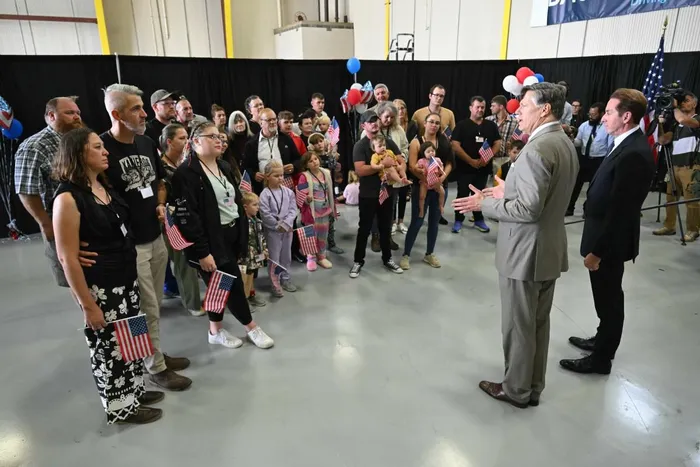‘Genocide’ lies and white victimhood: How far-right forces are undermining South Africa

Misinformation campaigns threaten South Africa's democracy and sovereignty
Image: Saul Loeb
Experts have warned that a concerted effort, potentially driven by foreign actors and aligned with domestic far-right groups, is fuelling misinformation campaigns, including false genocide claims against the white minority in South Africa.
They argued that these efforts threaten South Africa’s sovereignty, damage diplomatic relations—particularly with the United States—and threaten the nation’s hard-won social cohesion.
Experts asserted that since South Africa publicly took a stand against human rights violations committed by Israel and voiced support for Palestinian rights, it has become the target of a coordinated misinformation campaign.
This campaign seeks to distort South Africa’s foreign policy, casting it as a rogue state aligned with “evil” nations such as Iran and China, and accusing it of domestic racism and expropriation policies.
Prominent South African-born billionaires, some with ties to President Donald Trump’s circles, are believed to be involved in orchestrating smear campaigns.
These narratives have gained traction in the US, leading to diplomatic repercussions such as the US government’s decision to boycott South Africa’s role as G20 chair in 2025—a move seen by analysts as a form of cold sanctioning linked to South Africa’s foreign policy stance.
Dr Oscar Van Heerden, a University of Johannesburg political analyst, suggested that these narratives are part of a broader effort to craft a negative image of South Africa, portraying it as a nation no longer embodying Nelson Mandela's values.
The Rise of White Nationalist Ideology in the US
Ashrad Patel, a Senior Research Associate at the Institute for Global Dialogue (IGD), linked these developments to the ideological currents within the current U.S. political landscape, particularly the so-called “Project 2025” initiative related to the “Make America Great Again” movement.
“This project, centered on white nationalist identity and anxieties over demographic change, echoes old apartheid-era narratives and has been embraced by certain South African opposition groups, including the Democratic Alliance (DA) and the far-right Freedom Front Plus (FF+),” Patel explained.
“The narrative of white victimhood and minority rights in South Africa is being exploited to rally support for these groups in the U.S., framing South Africa’s policies, like land reform and affirmative action, as ‘anti-white’ and ‘anti-Constitutional’.
“These narratives are then used to justify lobbying efforts and influence US policy, including the potential undermining of trade agreements like the African Growth and Opportunity Act (AGOA).”
Domestic and External Power Struggles
Patel argued that the influence of South Africa’s domestic political landscape is significant.
“The inclusion of the DA and FF+ in the government has provided a platform for these narratives, which are framed as protecting minority rights but are often rooted in racialised perceptions.
“The lobbying efforts by Afriforum, a prominent far-right organisation, and other interest groups have intensified within South Africa and the United States."
Meanwhile, the US claims regarding the alleged genocide against white farmers have become a flashpoint.
Critics argue that this narrative is weaponised to justify external pressure and distract from domestic challenges like high inequality.
Allegations of Covert Operations and Diplomatic Interference
Independent political analyst Joe Mhlanga raised concerns about covert operations to tarnish South Africa’s image.
“It’s alarming that private NGOs, funded by foreign interests, are engaging directly with US government officials on diplomatic issues concerning South Africa,” he said
The South African government has responded by publicly criticising these efforts.
Minister Khumbudzo Ntshavheni announced that the State Security Agency is actively gathering intelligence on individuals and organisations spreading misinformation.
She condemned the US administration’s acceptance of what she called “Afrikaner Refugees”—a term used by groups like Afriforum to describe white South Africans claiming refugee status—arguing that there is no genocide in South Africa and that these claims are unfounded.
Implications for South Africa’s Democracy
Van Heerden said these developments threaten decades of diplomatic progress and social cohesion.
“The narrative of a 'failed South Africa' is being weaponised to justify external sanctions, internal destabilisation, and the rollback of democratic reforms.
In an effort to mend relations, President Cyril Ramaphosa announced earlier this month that he will meet Trump in the US next week.
thabo.makwakwa@inl.co.za
IOL Politics
